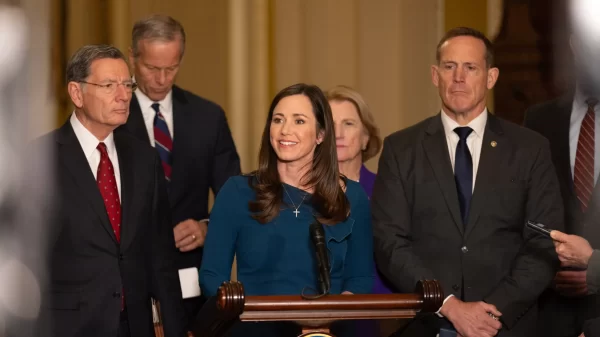House Armed Services Committee Chairman Mike Rogers, R-Alabama, led a Congressional delegation (CODEL) that included Rep. Gary Palmer, R-Alabama, to Taiwan, Japan, the Philippines, Hawaii, and Guam last week to maintain relations and “deter aggression by the Chinese Communist Party.”
The nine representatives met with Taiwan President Tsai on June 28. They discussed the June 1 launch of the U.S.-Taiwan Initiative on 21st-Century Trade — a trade agreement that aims to reform customs regime, trade regulation, and corruption — and support for Taiwan in the National Defense Authorization Act currently undergoing negotiation and revision in Congress.
“The national security threat posed by the Chinese Communist Party is the most pressing challenge facing our nation, as well as our allies and partners. On this CODEL, we heard from military and civilian leaders for the U.S., the Philippines, Taiwan, and Japan on what is being done to deter aggression by the CCP and boost defenses for the U.S., allies, and partners in the face of that challenge,” the delegation members said in a joint statement. “The critical nature of U.S. support is also apparent in Taiwan. We relayed to President Tsai that U.S. support for Taiwan is unwavering and we will do all we can to ensure Taiwan gets the assistance it needs.”
The CODEL landed in Taiwan a week after Secretary of State Antony Blinken visited Beijing and held direct security and economic talks with President Xi Jinping. Following the meeting, both sides agreed to continue fostering bilateral relations. A week after the CODEL visit, U.S. Treasury Secretary Janet Yellen began an ongoing trip to China.
“By visiting Taiwan, you are all demonstrating support for Taiwan-U.S. relations. I would like to sincerely welcome and thank you all,” Tsai told the CODEL. “I would like to thank the U.S. Congress for the longstanding and bipartisan attention it has shown to Taiwan’s security and for expressing support for Taiwan through concrete actions.”
Taiwan visits by U.S. officials have historically escalated tensions with China, most notably Nancy Pelosi’s, then speaker of the House, August 2022 visit that triggered large-scale military exercises by China in response.
“China strongly opposes official interactions of any form between China’s Taiwan region and countries that have diplomatic relations with China,” Chinese foreign ministry spokesperson Mao Ning said after the U.S.-Taiwan Initiative on 21st-Century Trade was launched. “We once again urge the United States to abide by the one-China principle and the three China-U.S. joint communiques, immediately change course and stop official interactions of any form with Taiwan, stop pushing forward and revoke at once the so-called ‘Initiative’ and agreement, and stop sending wrong signals to ‘Taiwan independence’ separatist forces; otherwise, all consequences shall be borne by the U.S. side.”
The delegation discussed anti-China measures at each stop. In Hawaii, the CODEL met with U.S. Indo-Pacific Command (INDOPACOM) Commander Admiral John Aquilino to discuss deterrence measures based out of Guam. The delegation also observed cooperation between the U.S. military and its counterparts in the Philippines and Japan.





















































